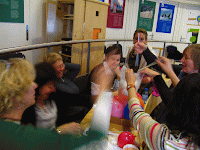Don’t Be Afraid of Fun in Institutional Learning
 The title of the next Chief Learning Officer Webinar I’ve signed up for is called, “Corporate Learning in 2010: Social, Mobile, Collaborative, Engaging and Fun.” I was interested to find an example of this – of how informal learning at the organizational level can be just that – here near Geneva last week.
The title of the next Chief Learning Officer Webinar I’ve signed up for is called, “Corporate Learning in 2010: Social, Mobile, Collaborative, Engaging and Fun.” I was interested to find an example of this – of how informal learning at the organizational level can be just that – here near Geneva last week.
I had lunch at WWF International in Gland, Switzerland, last Friday where they were just completing a Learning Week that featured five packed days of learning exchange from “How to take a good photograph” to hot topics like the Water Footprint on which WWF is working. When I walked into their offices at lunchtime I could feel the buzz – sessions were going on all over the building, often five in parallel, all internally sourced. Internally is defined broadly here, as some external people were presenting and running sessions too; these external people however – from globally recognized Business Schools and multi-national corporations – were all WWF partners who had taken the opportunity to contribute some of their knowledge to this organizational learning extravaganza.
Fun and learning are not mutually exclusive, as we all know, although having fun in the workplace is not what we have come to expect. It is refreshing to see how that synergy of informal learning and fun can open up space for real connections both at the content level and interpersonally, that can then lead to productivity results afterwards.
As I left, prizes were being given away by senior management for the best presenters, to the person that attended the most events, and so on, in the wrap up of this Learning Week. It no doubt ended with the same energy with which it started – Day 1 of the agenda featured a Staff Quiz, all about the institution and its work. Eight teams turned out in Fancy Dress (I hear), to compete in rounds towards the champion position. Team scoring was done by Senior management. The Pub Quiz format was about institutional learning and exchange, and also ticked the fun box for team development and relationship building. As a Learning Week launch it no doubt served as a wonderful icebreaker for the open discussions and cross-silo-fertilization of ideas that would no doubt follow such an activity.
Reducing “power distance” in organizational hierarchies can also be treated through fun – a staff party where Senior staff bartend, as WWF had, might demonstrate the service orientation of the highest level of management, not to mention model some of the acute listening skills that bartenders are well-known for (and not just for drink orders.) In addition, everyone was invited to submit a session idea, again taking decision-making out of the hands of a few and into those of many, now co-creators of the content.
These are the kind of clever decisions that have important and subtle effects.
Whether skills building or learning about one another’s programmatic work, event titles on the five-page agenda, featuring over 75 events, were innovative too (“Herding Cats 101” building facilitation skills, and “How to manage your energy, not your time”), promising fun and interaction and not just a barrage of PowerPoint. (In fact, guidelines sent out in advance requested reduced reliance on PPT). Even the physical spaces that were used made that in some cases impossible, I saw a hands-on session happening at a clutch of computers in an open space area, others were in the Visitor’s area – unusual spaces for this kind of exchange that signaled something different than business as usual.
Why not host an in-house learning event/conference that is a provocative mix of formal and informal peer-learning which is interesting, useful and most importantly fun. It takes some courage to put on such an event, but the opt-in, staff-built programme with lots of choice no doubt helps people tailor their learning needs to their own interests, and allows them to learn much more about and from their peers through the shared format of fun.



Leave a Reply
Want to join the discussion?Feel free to contribute!